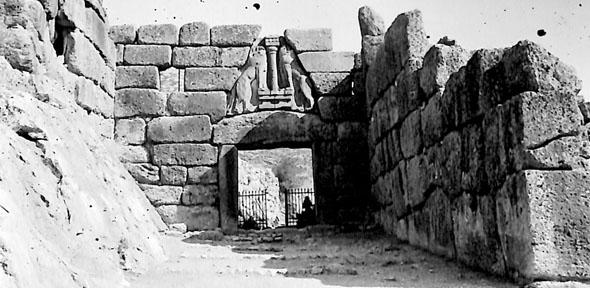
Overview of the Collection
The mission of the Faculty of Classics Archives is to collect, document, preserve, research and promote archival evidence of the study of the ancient Greek and Roman world. In particular, the Archives hold primary source materials connected to the work of Classics Faculty staff and scholars across the five caucuses: Classical literature, ancient philosophy, ancient history, Classical art & archaeology and linguistics.
At the heart of these Archives is the Mycenae Excavation and Publication Archive, donated by Dr Elizabeth French in 2013, which documents British excavations at the UNESCO World Heritage site of Mycenae, Greece, between 1920-1969. It comprises over 240 field notebooks, 6000 transparencies (slides), 3000 photographs and negatives, architectural and illustrative drawings, correspondence, publications and working papers. ‘Digital Mycenae’ - which showcases the notebooks, drawings, plans and photographs from the 1920-1957 excavation era - was launched on the Cambridge Digital Library in June 2020.
The Archives also preserve the professional papers of Professor Alan J. B. Wace, excavator of Mycenae (1920-1957) and Laurence Professor of Classical Archaeology (1934-1944), Dr E. B. W. French, Mycenaean pottery expert and Director of the British School of Athens (1989-1994) and Lord William Taylour, who led British excavations at Mycenae 1959-1969.
The Michael B. Walbank Archive consists of 3,000 epigraphic squeezes of inscriptions from the Athenian Agora excavations, Corinth and sites in Attica, with accompanying index cards, photographs and notebooks. Michael H. Crawford’s working papers for the publication Imagines Italicae are preserved together with his collection of rare off-prints and photographs and notes on Roman Republic coin hoards.
The Archives hold W. H. D. Rouse’s collection of Greek folk tales collected in the early 20th century. Other, smaller groups of papers derive from classicists such as the botanist Alice Lindsell, archaeologist Frank Stubbings, educator Bertrand Hallward and the philosopher G. E. L. Owen. The Archives provide access to the notebooks and papers of Col. W. M. Leake, soldier, antiquarian and topographer in the eastern Mediterranean at the time of the Napoleonic Wars.
For information regarding the collections of the Archives, please contact the Archivist at archives@classics.cam.ac.uk.
Cataloguing is ongoing; series and file level descriptions are available via the University Library's central database for Cambridge archives,
Visiting
The Archives are noramlly open by appointment to researchers on Mondays, 10am-4pm. To arrange a visit and to discuss the material that you wish to consult, please contact the Archivist at least two weeks in advance by email archives@classics.cam.ac.uk, telephone 01223 335167 or in writing (Archivist, Faculty of Classics, Sidgwick Avenue, CB3 9DA). On account of prior bookings, public and University holidays and staff availability, you are advised to apply as far in advance as possible.
Upon arrival at the Faculty, please introduce yourself to staff in the Enquiries Office who will ring through to the Archivist. Lockers and coat pegs are available for bags, umbrellas and coats. Readers must present one form of photo ID and sign an Archives Request form, thereby agreeing to abide by Reading Room and document handling rules and to uphold copyright law(s).
The Archives are located on the ground floor of the Faculty. There is level, paved access to the building itself and wide doors and continuous level floors within which facilitate wheelchair and disabled access.
Reprographics and Copyright
Readers may photograph items for private and non-commercial research subject to copyright law, depositor conditions and restrictions mandated by general data protection regulation. Prior to photography, an Archives Reprographic form should be completed; copies made for private study must not be sold, circulated or recopied.
No flash photography, tripods or other specialized photographic equipment are permitted. On account of the fragile nature of archival records, photography may not be possible for some items.
Images intended for publication and commercial use must credit the Faculty of Classics if copyright belongs to us. The copyright may lie outside the Faculty and, if so, it is incumbent upon the researcher to seek appropriate written permission to publish any such material. All terms and conditions must be agreed to before the image or other material may be used.

